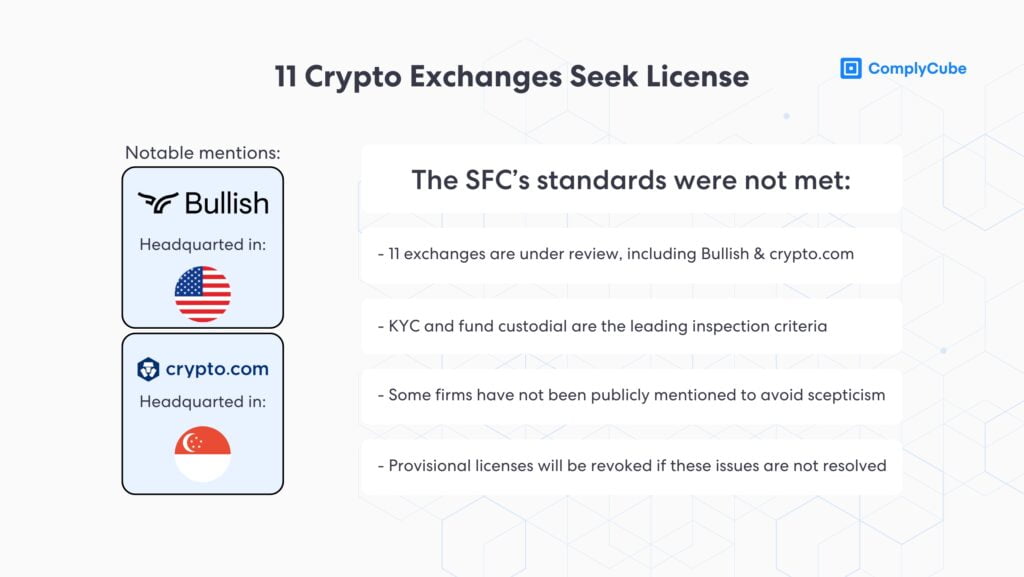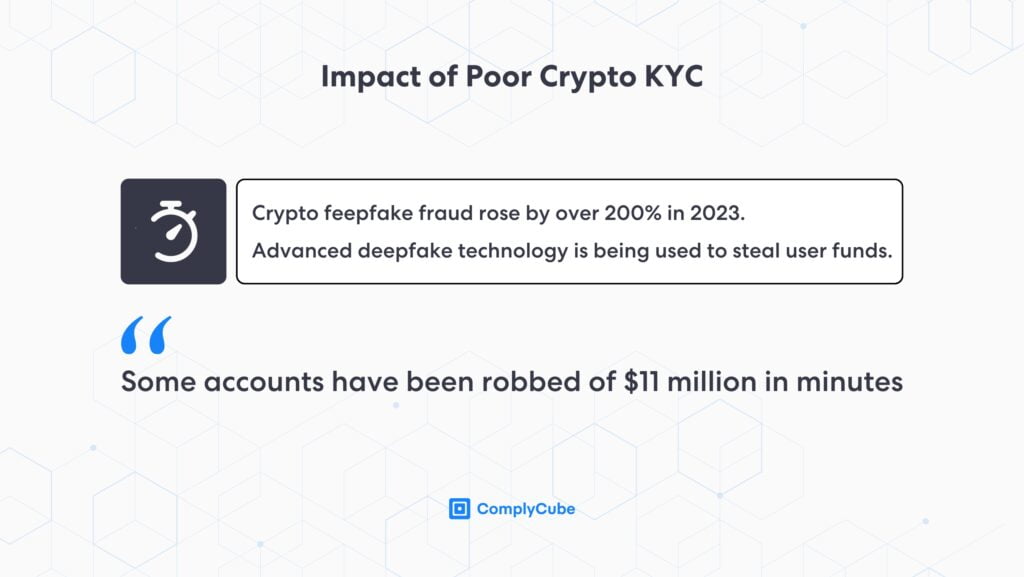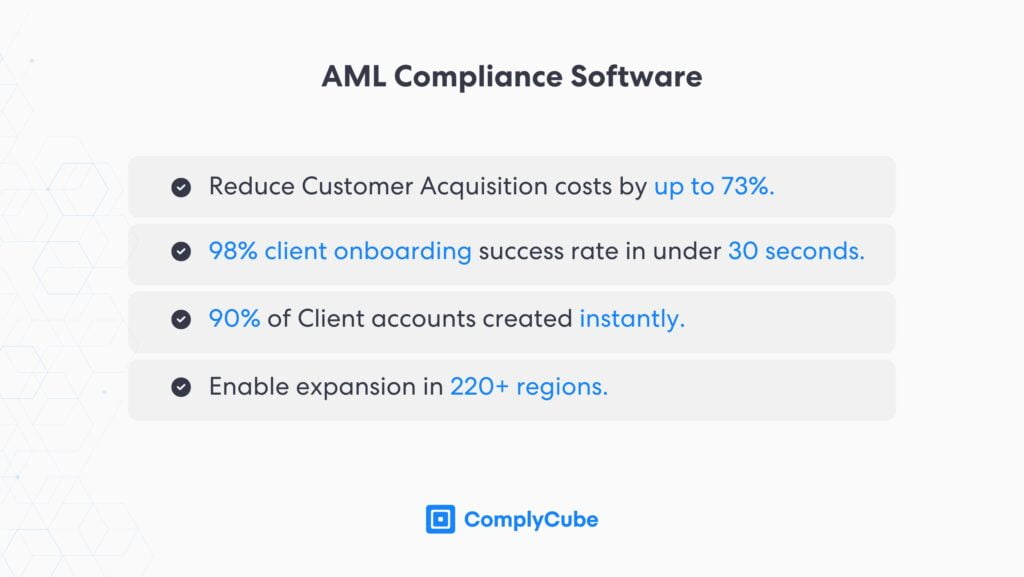New Hong Kong crypto regulations have highlighted client safety and Know Your Customer (KYC) processes as key vulnerabilities in the region’s crypto sector. These updated SFC crypto regulations aim to help deliver more licenses to crypto exchanges by the end of 2024. However, the region’s crypto KYC and general regulatory framework have often been cited as complex to navigate.
Platforms that are unable to negotiate these regulations and fix compliance deficiencies may find their provisional crypto licenses voided. This guide digests what is expected of crypto exchanges in Hong Kong in order to qualify for an SFC license.
SFC Crypto Landscape
Under the Securities and Futures Commission (SFC), Hong Kong has implemented a robust regulatory framework for the region’s crypto assets industry. These regulations, which were majorly upgraded in June 2023, focus on user safety through enhanced custody arrangements and tightened KYC programs.

Only two exchanges, HashKey and OSL, have obtained a full license from the SFC, evidencing the challenges that firms face in meeting the region’s crypto regulations. Currently, 11 exchanges are under review for a full Virtual Asset Trading Platform (VATP) license.
These crypto firms are not allowed to onboard new clients until they are fully compliant with the region’s legislation and have obtained this license. The SFC CEO, Julia Leung, expects to issue licenses to all firms that are 100% compliant by the end of the year.
Hong Kong Crypto Regulations: The Licensing Regime
Following the Hong Kong Monetary Authority (HKMA) and SFC’s updated legislation in 2023, there have been renewed initiatives focusing primarily on two agendas:
- How crypto exchanges onboard new clients via their KYC process.
- How Virtual Asset Trading Platforms safeguard client funds via their custodial services.
Safeguarding Client Assets
Recent VATP inspections revealed significant concerns and vulnerabilities in the reliance on a limited number of executives for asset custody, which poses substantial risks to the security and integrity of client funds.
Exchanges operating within the region must implement robust measures to protect these assets and address any vulnerabilities that could expose them to cybercrime or other forms of financial misconduct.
The SFC has made clear that VATPs will have their licenses revoked or denied if substantial security systems and processes are not put in place before the end of 2024. Hong Kong regulators’ demands demonstrate their approach to leaving no regulatory stone unturned to stabilize the region’s industry.
Crypto KYC in the Virtual Assets Industry
Adopting a sufficient KYC strategy has proved challenging for many exchanges operating in Hong Kong, leading some firms to withdraw from obtaining a license for the region at all. Further clarification of crypto KYC regulations evidences how important a robust Anti-Money Laundering and Know-Your-Customer strategy is in the industry.

Both HashKey and OSL demonstrate very strong customer onboarding and compliance strategies, contributing to their success in obtaining operation licenses. HashKey’s onboarding process involves robust KYC processes, including Identity Verification (IDV), financial information, various Virtual Asset (VA) knowledge tests, and bank account verification.
Users are also monitored around the clock to ensure their personal or domestic circumstances have not changed or been compromised. An all-in-one compliance solution, such as ComplyCube, easily overcomes all of these challenges.
For more information on Hong Kong crypto regulations, including a comprehensive overview of the related legislation, including the Counter-Terrorist Financing Ordinance (AMLO) and other key regulatory bodies, read Hong Kong Crypto Regulation in 2024.
ComplyCube’s Crypto KYC Solution
Complying with the Hong Kong government and its crypto regulations is challenging without the right compliance partner. However, while challenging to comply with, regulators have created these rules and regulations for good reason.
Multiple significant regulatory bodies worldwide, including the Financial Action Task Force (FATF), Financial Crimes Enforcement Network (FinCEN), and the Basel Committee on Banking Supervision (BCBS), endorse automated technology to achieve compliance and safeguard the financial and digital assets markets.

These compliance technologies are advocated due to their resilience against innovative fraudulent methods. The crypto market has experienced the highest rate of fraudulent attacks, particularly deepfakes. For more information on this, read Why Identity Verification AI is crucial.
ComplyCube already supplies a range of solutions to Virtual Asset Service Providers (VASPs) around the globe, the types of AML and KYC solutions that help achieve compliance with the SFC. All VASPs or financial institutions with VA dealing services require:
- Robust Identity Verification, including document and biometric verification.
- Customer Due Diligence (CDD), including a host of AML checks.
- Ongoing monitoring to ensure client circumstances remain constant.
- Transaction screening and monitoring.
- VASP analysis.
Comply With Hong Kong Crypto Regulations
The compliance leader’s crypto KYC solution is rated 10/10 on TrustRadius, with one VASP in particular noting its enhanced security and analytics features which simplified and enabled its international expansion.
Enhanced security for trader onboarding, advanced analytics, and great support.
Such a remark reflects their triumph at providing a market-leading service that is a far broader service than just a vehicle for achieving compliance. If your VASP, fintech, or related firm requires precision onboarding and compliance solutions, get in touch with a ComplyCube specialist to learn more.



